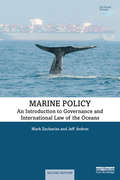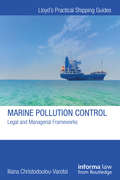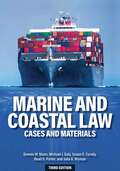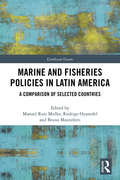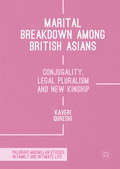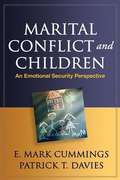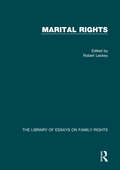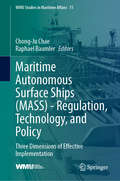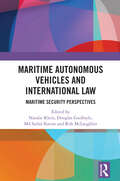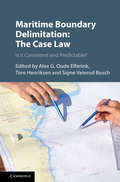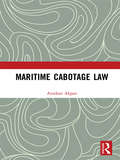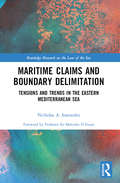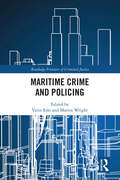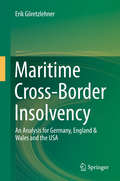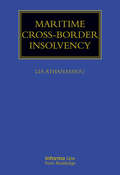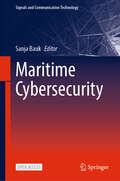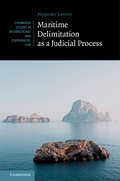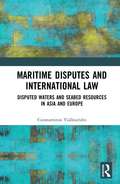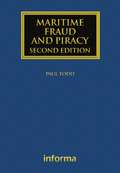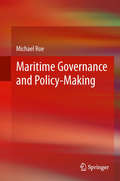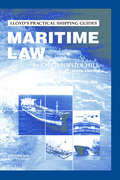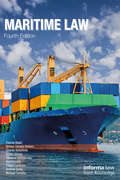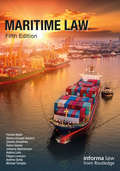- Table View
- List View
Marine Policy: An Introduction to Governance and International Law of the Oceans (Earthscan Oceans)
by Mark Zacharias Jeff ArdronThis book provides readers with a foundation in policy development and analysis, describing how policy, including legal mechanisms, are applied to the marine environment. It presents a systematic treatment of all aspects of marine policy, including climate change, energy, environmental protection, fisheries, mining and transportation. The health of marine environments worldwide is steadily declining, and these trends have been widely reported. Marine Policy summarizes the importance of the ocean governance nexus, discussing current and anticipated challenges facing marine ecosystems, human activities, and efforts to address these threats. This new, fully revised edition has been updated throughout, including content to reflect the recent advances in ocean management and international law. Chapters on shipping, energy/mining and integrated approaches to ocean management have been significantly reworked, plus completely new chapters on the United Nations Convention on the Law of the Sea, and the impacts of climate change have been added. Pedagogical features for students are included throughout. Aligned with current course offerings, this book is an ideal introduction for undergraduates and graduate students taking marine affairs, science and policy courses.
Marine Pollution Control: Legal and Managerial Frameworks (Lloyd's Practical Shipping Guides)
by Iliana Christodoulou-VarotsiThis book discusses in a concise manner the key aspects that are important for the understanding of regulations and managerial framework governing marine pollution. It identifies the practical context in which marine pollution comes into play and addresses the international legal regime governing the numerous sources of marine pollution, as well as the ways in which these regulations affect the conduct of day-to-day shipping operations. With illustrations, case studies, emphasis boxes, references to case law and to national jurisdictions and other tools facilitating understanding and knowledge, readers will find helpful guidance on: the sources of marine pollution (including ship-source pollution and pollution from the offshore oil and gas sector); the forms of cooperation needed in order to tackle the prevention, management and response to marine pollution; overview of MARPOL Convention, other key IMO conventions, and selected regional regimes; legal ramifications, including P & I Clubs and limitation of liability; involvement of the flag State, coastal State and port State; industry best practice; the human element Marine Pollution Control will be a useful guidance tool for shipping Industry professionals, (P & I) Clubs, Legal practitioners, maritime administrators, as well as academics and students of marine pollution.
Marine Pollution, Shipping Waste and International Law (Routledge Research in International Environmental Law)
by Gabriela ArgüelloWaste management poses increasing challenges to both the protection of the environment and to human health. To face these challenges, this book claims that environmental law needs to shift attention from media-specific pollution regimes to integrative life-cycle approaches of waste management i.e., from the prevention of waste generation to the actual handling of wastes. Furthermore, the cooperation of States and the establishment of coordinated activities is essential because states can no longer have separate standards for wastes posing transboundary risks and for ‘purely domestic’ wastes. Drawing upon both International and EU law, the book provides a detailed analysis of the regimes set up to deal with the transboundary movement of wastes and ship-source pollution, so as to elucidate the obligations and legal principles governing such regimes. It concludes that treaty obligations concerning transboundary movements of wastes are inapplicable to ship wastes while on board ships and on land. However, despite the limitations of the transboundary movement of wastes regime, the principle of Environmentally Sound Management (ESM) embodied in this regime has gradually transformed into a legal principle. ESM works to address the legal gaps in the regulation of wastes, and consequently, it provides the desired coherence to the legal system since it acts as a bridge between several regulatory and sectoral levels. Furthermore, ESM offers a new light with which to understand and interpret existing obligations, and it provides a renewed impetus to regimes that directly and indirectly govern wastes. This impetus translates into greater coordination and the establishment of cross-sectional policies. By offering alternative ways to solve problems linked to the management of ship wastes in the sea-land interface, this book will appeal to anyone with an interest in International Environmental Law.
Marine and Coastal Law: Cases and Materials
by Dennis W. Nixon Michael J. Daly Susan E. Farady Read D. Porter Julia B. WymanThis thoroughly revised and updated third edition of the prestigious Marine and Coastal Law casebook provides an essential overview of landmark legal decisions and statutory provisions in U.S. marine and coastal law, with a particular emphasis on regulatory changes and legal conflicts involving climate change, coastal resilience/protection, and sea level rise. In addition to a thorough updating of the contents of the second edition (including editorial commentary on every case), this new revised edition features extensive new content, including two entirely new chapters and new "learning objectives" for each chapter. <p><p> Produced by five experts in U.S. marine law, this third edition stands as an accessible and invaluable resource for both lay readers and legal professionals who are seeking greater understanding of the ever-evolving and frequently contentious laws and regulations governing U.S. and international fisheries, maritime shipping and transport, offshore oil and mineral resources, climate change mitigation strategies, coastal protection, marine pollution, and port and harbor operations.
Marine and Fisheries Policies in Latin America: A Comparison of Selected Countries (Earthscan Oceans)
by Manuel Ruiz Muller Rodrigo Oyanedel Bruno MonteferriThis book reviews the frameworks and implementation of marine, fishery and coastal laws and policies in Chile, Mexico and Peru. Chile, Mexico and Peru share biodiverse coastal and marine environments which are being affected by unregulated and informal developments, and thus share similar challenges. Each country is currently at a different stage of advancement in their institutional response to these complex challenges. By providing a comparison of the frameworks, approaches and overall implementation of policies and laws, this book acts as a tool to influence and inform further efforts in conservation and sustainable use of marine resources, particularly fisheries, in these countries and others in Latin America and the Caribbean. A broad range of issues are covered including food security, tourism, fisheries, oil and mineral extraction from the seabed, wind power, coastal and marine pollution and endangered species conservation. The chapters compare how each country addresses these issues from an institutional, legal and policy perspective. The book concludes by identifying common lessons, reoccurring challenges and develops scalable recommendations applicable to the case study countries and the wider region. The book will be of interest to advanced students, policy makers and researchers in marine and fishery science, law and policy.
Marital Breakdown among British Asians
by Kaveri QureshiAgainst long-standingcharacterizations of British Asians as 'flying the flag' for traditional life,this book identifies an increase in marital breakdown and argues to reorientdebates about conservatism and authoritarianism in British Asian families. Qureshidraws on a rich ethnographic study of marital breakdown among working classPakistani Muslims in order to unpick the grounds of marital conflict, themanoeuvres couples undertake in staying together, their interactions withdivorce laws and their moral reasonings about post-divorce family life. MaritalBreakdown among British Asians argues against individualization approaches,demonstrating the embeddedness of couples in extended family relations, whilstat the same time showing that Pakistani marriages and divorces do not deviatein all respects from wider marital separation trajectories in Britain. Providing new insights into how marital breakdown is changing the contoursof British Asian families, this book will be essential reading for scholars andstudents, clinicians working in couple or family therapy, social workers andlegal practitioners.
Marital Conflict and Children
by Patrick Davies E. Mark CummingsFrom leading researchers, this book presents important advances in understanding how growing up in a discordant family affects child adjustment, the factors that make certain children more vulnerable than others, and what can be done to help. It is a state-of-the-science follow-up to the authors' seminal earlier work, Children and Marital Conflict The Impact of Family Dispute and Resolution. The volume presents a new conceptual framework that draws on current knowledge about family processes; parenting; attachment; and children's emotional, physiological, cognitive, and behavioral development. Innovative research methods are explained and promising directions for clinical practice with children and families are discussed.
Marital Rights (The\library Of Essays On Family Rights Ser.)
by Robert LeckeyThis volume gathers influential and cutting-edge scholarship on the international and domestic rights attaching to married couples and other adult relationships. Addressing examples from the European Court of Human Rights, UK, USA, Canada, Australia and South Africa, it traces contentious debates about the content of marital rights and responsibilities and whether law should reach beyond marriage, and if so how. Twenty-four essays and a substantial introduction highlight the complexity and contradictions as marital law grapples with gender equality, the aftermath of recognizing gay and lesbian rights, abiding economic inequalities, and �exotic� issues such as forced marriage and polygamy.
Maritime Autonomous Surface Ships: Three Dimensions of Effective Implementation (WMU Studies in Maritime Affairs #11)
by Chong-Ju Chae Raphael BaumlerThis book covers MASS regulation, technology, and policy. MASS development began with the realization of the 4th industrial revolution technologies such as big data, AI, IoT, and communication, which were also linked to technological development in the maritime field. However, it is still unclear how MASS will operate. This book is divided into three parts: MASS regulation, technology, and policy, and explains each part in detail. Part I “MASS regulation and safety” deals with IMO works for MASS, including IMO MASS RSE results which has been finished in 2021. In addition, the United Nations Convention on the Law of the Sea (UNCLOS), one of the most important international conventions to be considered for MASS operation, will be dealt with and various safety considerations will be explained in detail. Through this, this book explains in detail the regulatory considerations and safety considerations for MASS. In particular, the gaps and themes identified in IMO MASS RSE and the priority discussion needs are explained, and based on this, the development of a goal-based non-mandatory MASS code currently in progress is discussed. UNCLOS is a convention like the blueprint of the IMO Conventions, and it is very important to understand and meet the requirements of UNCLOS for the operation of MASS. Therefore, this book provides a detailed explanation of the application of UNCLOS. In particular, UNCLOS Article 94 would be a very important consideration. Also, this book covers COLREGs and technologies for MASS operations.
Maritime Autonomous Vehicles and International Law: Maritime Security Perspectives
by Natalie Klein Md Saiful Karim Rob McLaughlin Douglas GuilfoyleMaritime autonomous vehicles (MAVs) have the potential to radically alter all uses of maritime space, with technology progressing faster than the law. This book explores the current international legal framework and the options available to regulate maritime security in the face of emerging technologies.MAVs are starting to play a role not only in policing and military security but also for the perpetration of maritime crimes. Through discussing the existing international legal framework for combating maritime security threats, the book will consider the use of MAVs by states for various security purposes and the potential dangers of MAVs in the hands of non-state actors. As the intersection of maritime technology with international maritime security law is crucial to a safe future for all, this timely book makes essential suggestions to adapt existing legal frameworks to match emerging technologies. Addressing critical questions such as who exercises jurisdiction when ships are remotely controlled, how jamming technology may be lawfully deployed and what force may be permissible during maritime law enforcement, this book identifies a diversity of current legal gaps and problems and makes suggestions as to how to rectify them.This book will be of interest to students and scholars in the field of the law of the sea, maritime security and emerging technologies.
Maritime Boundary Delimitation: Is It Consistent and Predictable? (Publications On Ocean Development Ser. #24)
by Oude Elferink Alex G. Tore Henriksen Signe Veierud BuschThe law of maritime delimitation has been mostly developed through the case law of the International Court of Justice and other tribunals. In the past decade there have been a number of cases that raise questions about the consistency and predictability of the jurisprudence concerning this sub-field of international law. <P><P>This book investigates these questions through a systematical review of the case law on the delimitation of the continental shelf and the exclusive economic zone. Comprehensive coverage allows for conclusions to be drawn about the case law's approach to the applicable law and its application to the individual case. Maritime Boundary Delimitation: The Case Law will appeal to scholars of international dispute settlement as well as practitioners and academics interested in the law concerning the delimitation of maritime boundaries.
Maritime Cabotage Law
by Aniekan AkpanThis is the most comprehensive review of maritime cabotage law. It introduces the new theory of Developmental Sovereignty to jurisprudence. The maritime cabotage law provisions and approaches as adopted in many states and jurisdictions has been extensively scrutinised. This book challenges the established and accepted wisdom surrounding maritime cabotage by presenting new reasoning on the underpinning principles of the concept of maritime cabotage law. The book offers a vibrant discussion on the adjustment in the regulatory approaches of maritime cabotage, from one that was intrinsically premised on the idea of national sovereignty, to one that now embraces the broader ideology of development. It investigates what the common understanding of the law of maritime cabotage should be and on what intellectual basis it can be justified. It reduces the inconsistencies and confusion that surround the concept and application of maritime cabotage law, to provide a more certain and more robust concept of maritime cabotage.
Maritime Claims and Boundary Delimitation: Tensions and Trends in the Eastern Mediterranean Sea (Routledge Research on the Law of the Sea)
by Nicholas A. IoannidesThis book delves into the major developments triggered by the hydrocarbon discoveries in the Eastern Mediterranean over the last twenty years, focusing on maritime boundary delimitation. Examining the impact that the hydrocarbon discoveries have had on the application of the law of the sea rules by the East Med states, the book looks at the new trends concerning the implementation of the law of the sea in the region. The book analyses regional state practice in terms of maritime delimitation, namely the conclusion of bilateral agreements based on the law of the sea rules, both conventional and customary, reflecting the East Med states’ willingness to cooperate in order to reap the benefits of the energy windfall. Alongside this analysis, an outline of the hydrocarbon discoveries and the pertinent maritime activities is given, as well as further coverage of the overlapping maritime claims and disputes between Greece, Cyprus and Turkey on one side, and Lebanon and Israel on the other. Moreover, the book examines the validity of maritime claims made by or through non-state entities in the region, namely the State of Palestine, the UK Sovereign Base Areas and the so-called ‘Turkish Republic of Northern Cyprus’ and their potential impact on the delimitation agreements already in place. The book argues that the East Med paradigm concerning the successful application of the pertinent norms in maritime delimitation proves that international law is resilient and capable of providing solutions in other turbulent regions around the globe. This book will be of interest and importance to academics and students of international law, professionals in the oil and shipping industries, legal professionals and government agencies.
Maritime Crime and Policing (Routledge Frontiers of Criminal Justice)
by Martin Wright Yarin EskiThis book offers a unique and scholarly perspective on a little-studied subject: maritime crime and policing. The seas and oceans cover 70 percent of the earth’s surface and 90 percent of world trade by volume travels by sea. Furthermore, the refugee crisis has produced an inflow of people attempting to find a better life, particularly in Northwest Europe and the UK, which has had an impact on the maritime domains of European ports. While there has been attention paid to the role of maritime policing by scholars in maritime security studies, little attention has been paid by criminologists and policing studies scholars. This book aims to fill this gap. Bringing together a range of international scholars, this book covers a variety of topics pertinent to maritime crime and its policing, such as fraud, piracy and armed robbery at sea, illegal and unregulated fishing, smuggling, people trafficking, illegal immigration, illegal dumping and pollution, arms trafficking, terrorism, and cargo theft. It brings together new perspectives on several key criminological themes such as transnational organised crime, criminalisation, and securitisation and provides a bold new direction for the landlocked discipline of criminology and policing studies. An accessible and compelling read, this book will be of interest to students and scholars of criminology, policing, sociology, politics, migration studies, and all those interested in the policing of the sea.
Maritime Cross-Border Insolvency: An Analysis for Germany, England & Wales and the USA
by Erik GöretzlehnerThis book provides an analysis and comparison of international insolvency rules, maritime laws and their inevitable intersection in maritime cross-border insolvencies. Until today, the on-going shipping crisis resulted in the insolvency of numerous shipping companies all over the world. The tensions arising between the legal systems of maritime and insolvency law, paired with conflicts of law in maritime insolvencies, are a major source of legal uncertainty and risk. In 2010, the Comité Maritime International installed an international working group on international maritime insolvencies and until today it is work in progress. This book gives an overview on maritime insolvencies, with a focus on Germany, England & Wales and the USA, and assesses the chances of achieving meaningful harmonization in the complex scenarios, where ships as mobile assets add a further complication to international insolvency proceedings.
Maritime Cross-Border Insolvency: Under the European Insolvency Regulation and the UNCITRAL Model Law (Maritime and Transport Law Library)
by Lia AthanassiouMaritime Cross-Border Insolvency is a comprehensive comparative examination of both insolvency regimes (UNCITRAL and EU) in shipping with reference to the main jurisdictions having adopted the UNCITRAL regime, i.e. USA, UK, Greece.
Maritime Cybersecurity (Signals and Communication Technology)
by Sanja BaukThis book highlights the importance of cybersecurity in the maritime domain, including the human and societal aspects of both cyber-crime and cyber-defense. The authors present mechanisms for early detection and prevention of cyber-attacks, as well as security protocols based on testbed nautical simulator experiments, machine learning algorithms and artificial intelligence applications. This collection of research articles addresses the ethical, societal and technical aspects of maritime cybersecurity and offers solutions to mitigate the threat of cyber-attacks. The book is designed to help both researchers and stakeholders across the maritime ecosystem, including shipping and port logistics. Research findings are presented in the following areas: human factors in maritime cyber security, cyber security awareness and skills of seafarers, vulnerabilities in electronic maritime navigation on manned and unmanned vessels, internal and external attack vectors on bridge and propulsion systems, cyber security threats and countermeasures in seaports. The book serves as a handbook for those professionally involved in or interested in cybersecurity of IT and OT systems. This book is open access, which means that you have free and unlimited access.
Maritime Delimitation as a Judicial Process (Cambridge Studies in International and Comparative Law #144)
by Massimo LandoMaritime Delimitation as a Judicial Process is the first comprehensive analysis of judicial decisions, state practice and academic opinions on maritime boundary delimitation. For ease of reading and clarity, it follows this three-stage approach in its structure. Massimo Lando analyses the interaction between international tribunals and states in the development of the delimitation process, in order to explain rationally how a judicially-created approach to delimit maritime boundaries has been accepted by states. Pursuing a practical approach, this book identifies disputed points in maritime delimitation and proposes solutions which could be applied in future judicial disputes. In addition, the book engages with the underlying theories of maritime delimitation, including the relationship between delimitation and delineation, the effect of third states' rights on delimitation, and the manner in which each stage of the process influences the other stages.
Maritime Disputes and International Law: Disputed Waters and Seabed Resources in Asia and Europe
by Constantinos YiallouridesThe settlement of the maritime boundary disputes between China and Japan in the East China Sea, and between Greece and Turkey in the Aegean Sea, is politically deadlocked. While diplomatic settlement efforts have been ongoing for the past several decades, neither side in each case appears prepared to back down from its respective maritime and territorial claims. Several incidents at sea have occurred, prompting diplomatic protests, military standoffs, even exchange of fire. The existing status quo is inherently unstable and does not favour either side to the extent that it holds hostage the multiple benefits that could otherwise be generated from the exploitation of the seabed energy and mineral resources in the disputed waters, creating an urgent need for a meaningful discussion on finding a practical way forward. This monograph undertakes a comprehensive analysis of these disputes based on the rules and principles of international law, critically evaluating possible institutional designs of inter-State cooperation over seabed activities in disputed maritime areas and makes recommendations for the prospect of realising joint development regimes in the East China Sea and the Aegean to coordinate the exploration for and exploitation of resources without having resorted previously to boundary delimitation settlement.
Maritime Fraud and Piracy (Maritime and Transport Law Library)
by Paul ToddThe main focus of this book is the impact of maritime fraud on contracts for sale and carriage, documentary credits and marine insurance. It covers all varieties of maritime fraud, from the most serious downwards, describing the methods employed and the risks to traders and carriers. At the serious end of the spectrum, pirates capture an entire ship, often murdering the entire crew, in order to sell the cargo (to which of course they have no title), later to use the “innocent” ship to pose as innocent traders. Less serious (but perhaps of greater interest to lawyers) are misdescriptions of cargo in, or backdating of, bills of lading, and other deceptions, usually practised on purchasers and banks.
Maritime Governance and Policy-Making
by Michael RoeA close analysis of the framework of existing governance and the existing jurisdictional arrangements for shipping and ports reveals that while policy-making is characterized by national considerations through flags, institutional representation at all jurisdictions and the inviolability of the state, the commercial, financial, legal and operational environment of the sector is almost wholly global. This governance mismatch means that in practice the maritime industry can avoid policies which it dislikes by trading nations off against one another, while enjoying the freedoms and benefits of a globalized economy. A Post-modern interpretation of this globalized society prompts suggestions for change in maritime policy-making so that the governance of the sector better matches more closely the environment in which shipping and ports operate. Maritime Governance and Policy-Making is a controversial commentary on the record of policy-making in the maritime sector and assesses whether the reason for continued policy failure rests with the inadequate governance of the sector. Maritime Governance and Policy-Making addresses fundamental questions of governance, jurisdiction and policy and applies them to the maritime sector. This makes it of much more interest to a much wider audience - including students, researchers, government officials, and those with industrial and commercial interests in the shipping and ports areas - and also of more value as it places the specific maritime issues into their wider context. Maritime Governance and Policy-Making addresses fundamental questions of governance, jurisdiction and policy and applies them to the maritime sector. This makes it of much more interest to a much wider audience - including students, researchers, government officials, and those with industrial and commercial interests in the shipping and ports areas - and also of more value as it places the specific maritime issues into their wider context.
Maritime Interception and the Law of Naval Operations: A Study Of Legal Bases And Legal Regimes In Maritime Interception Operations
by Martin FinkThis book considers the international law applicable to maritime interception operations (MIO) conducted on the high seas and within the context of international peace and security, MIO being a much-used naval operational activity employed within the entire spectrum of today's conflicts. The book deals with the legal aspects flowing from the boarding and searching of foreign-flagged vessels and the possible arrest of persons and confiscation of goods, and analyses the applicable law with regard to maritime interception operations through the legal bases and legal regimes. Considered are MIO undertaken based on, for instance, the UN Collective Security System (maritime embargo operations), self-defence and (ad-hoc) consent, and within the context of legal regimes various views are provided on the right of visit, the use of force and the use of detention. This volume, which has contemporary naval operations as its central focus and structures the analysis as a sub-discipline of the international law of military operations, will be of great interest both to academics, practitioners and policy advisors working or involved in the field of military and naval operations, and to those professionals wanting to learn more about the international law of military operations, naval operations, and the law of the sea and maritime security.Martin Fink is a naval and legal officer in the Royal Netherlands Navy.
Maritime Law (Lloyd's Practical Shipping Guides)
by Christopher Hill Yash KulkarniMaritime Law is an exhaustive introduction to this complex area of law. The book is ideal for newcomers and experienced professionals requiring an update on the general principles and case law. • Charterparties chapter • Passengers chapter • Salvage – includes developments in case law and introduction of new Lloyd’s Open Form Salvage Agreement • Sale of ship and shipbuilding contracts • Collisions • Oil pollution – Convention on bunker spills
Maritime Law (Maritime and Transport Law Library)
by Yvonne BaatzNow in its fourth edition, this authoritative guide covers all of the core aspects of maritime law in one distinct volume. Maritime Law is written by a team of leading academics and practitioners, each expert in their own field. Together, they provide clear, concise and fully up-to-date coverage of topics ranging from bills of lading to arrest of ships, all written in an accessible and engaging style. As English law is heavily relied on throughout the maritime world, this book is grounded in English law whilst continuing to analyse the key international conventions currently in force. Brand new coverage includes: The entry into force of the Hague Convention on Choice of Court Agreements, 2005 and greater detail on Regulation (EU) No 1215/2012 of the European Parliament and of the Council of 12 December 2012 on jurisdiction and the recognition and enforcement of judgments in civil and commercial matters (recast). The entry into force of the Nairobi International Convention on the Removal of Wrecks, 2007. Discussion on the Arctic Sunrise and Duzgit Integrity arbitrations and the "Enrica Lexie" Incident (Italy v India), Provisional Measures in the International Tribunal for the Law of the Sea. Analysis of the Insurance Act 2015. Comment on recent cases including London Steam Ship Owners Mutual Insurance Association Ltd v Spain (The Prestige) and PST Energy 7 Shipping LLC v OW Bunker Malta Ltd (The Res Cogitans). This book is a comprehensive reference source for students, academics and legal practitioners worldwide, especially those new to maritime law or a particular field therein.
Maritime Law (Maritime and Transport Law Library)
by Yvonne BaatzNow in its fifth edition, this authoritative guide covers all of the core aspects of maritime law in one distinct volume. Maritime Law is written by a team of leading academics and practitioners, each expert in their own field. Together, they provide clear, concise and fully up-to-date coverage of topics ranging from bills of lading to arrest of ships, all written in an accessible and engaging style. As English law is heavily relied on throughout the maritime world, this book is grounded in English law whilst continuing to analyse the key international conventions currently in force. Brand new coverage includes: The impact of the European Union (Withdrawal Agreement) Act 2020 which amends the European Union (Withdrawal) Act 2018. Over one hundred new cases from the English courts, the Court of Justice of the European Union and the International Tribunal for the Law of the Sea. Changes to the Merchant Shipping (Registration of Ships) Regulations 1993, including the Merchant Shipping (Registration of Ships) (Amendment) (EU exit) Regulations 2019. Discussion of the Incoterms 2020 which are available for incorporation into sale contracts from 1 January 2020. Updates on litigation and amendments to the Admiralty Civil Procedure Rules. This book is a comprehensive reference source for students, academics and legal practitioners worldwide, especially those new to maritime law or a particular field therein.
